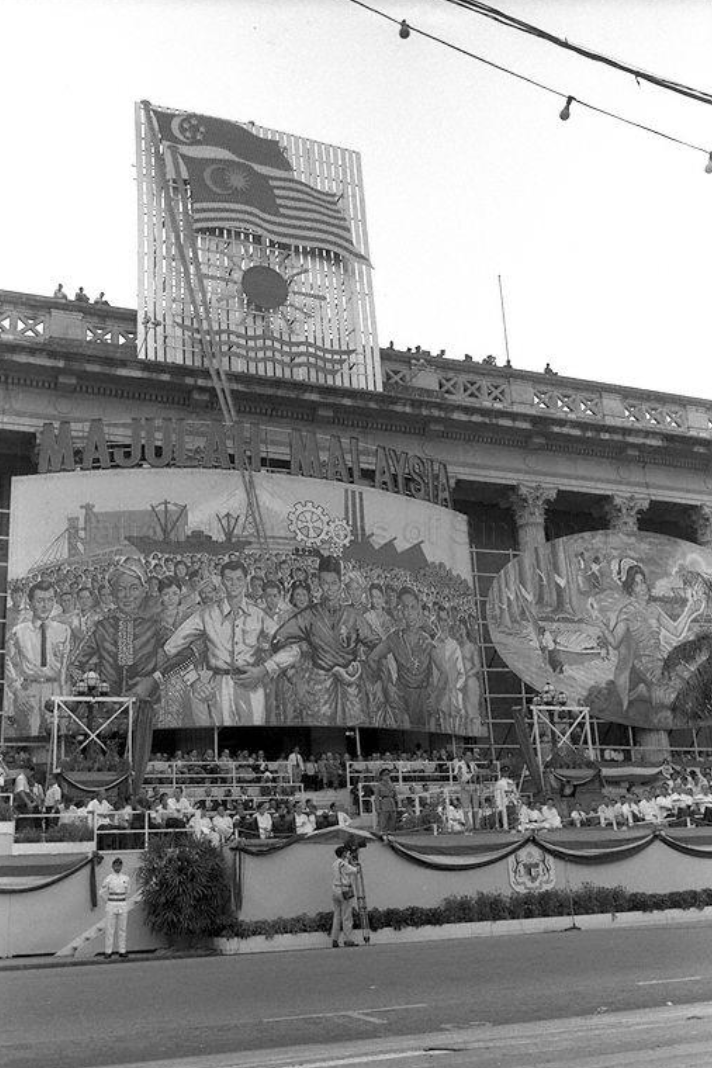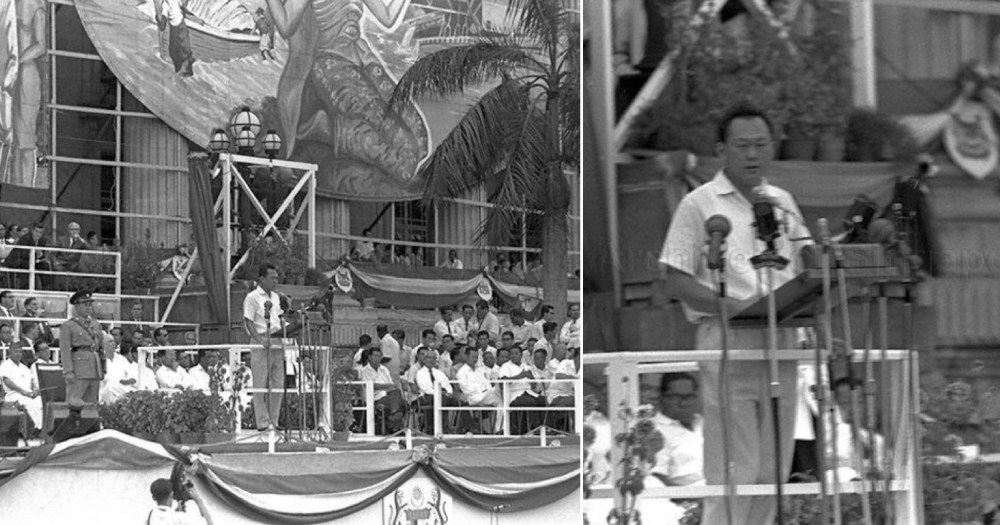Every year on Aug. 31, Malaysians celebrate Merdeka Day.
It was on this day in 1957 when the Federation of Malaya became independent from the colonial British rulers.
Not the same as Malaysia Day
Merdeka Day is not to be confused with Malaysia Day on Sept. 16.
While Merdeka Day is when many Malaysians celebrate the country's newfound sovereignty, Malaysia Day came to be in 1963, when Malaysia was officially formed with the merger of Malaya, Singapore, North Borneo and Sarawak.
Significance of Aug. 31 for Singaporeans and Malaysians
The date Aug. 31 has a Singapore connection too -- as some six years later, Singapore's first prime minister, Lee Kuan Yew, declared de facto independence on Aug. 31, 1963.
LKY declared independence from the British unilaterally
The announcement was made in a ceremonial rally held on the steps of City Hall, with giant Malaysian-themed murals as the backdrop.
 Image via Ministry of Information and the Arts Collection, courtesy of National Archives of Singapore
Image via Ministry of Information and the Arts Collection, courtesy of National Archives of Singapore
In front of thousands of people gathered on the padang, Lee proclaimed sovereignty in foreign affairs and defence.
At that time, Singapore was set to join the Federation of Malaysia.
The date for the proclamation of the Federation was originally set on Aug. 31, 1963, to coincide with the sixth Merdeka Day.
However, it was later postponed to Sept. 16, 1963, to give the United Nations more time to determine if the people of Sabah and Sarawak wanted to join Malaysia.
Right for Singapore to be free
At the rally, Lee made a speech where he pledged Singapore's loyalty to the federal government in Kuala Lumpur.
He also expressed the right for Singapore to be free from British rule:
"We have proclaimed our inalienable right to be free -- free from colonial domination. In a manner of our choice."
In addition, he expressed his hopes for Malaysia, saying that the future holds out "great promise, a promise of peace, stability and prosperity".
British were not happy
Unsurprisingly, the British were not amused with Lee's proclamation of independence from British rule, and they showed this by not sending any representatives to attend the ceremony.
At that time, they were the ones holding powers over Singapore's defence and external affairs.
The federal government was not happy either, and did not send its representatives as well.
Political strategy
Both the British and the federal government were not in agreement with Singapore's move to unilaterally declare independence before Sept. 16, 1963.
In addition, both sides questioned if Singapore's claim to powers over these areas --at least for the two weeks before it joins Malaysia -- was legal or constitutionally valid.
Writing in one of his memoirs, The Singapore Story, Lee revealed that he had disagreed with the postponement of the merger, as he had not wanted the now-defunct Barisan Sosialis party to make use of the delay to further campaign against the merger then.
Lee then decided to go ahead and announce Singapore's independence on Aug. 31, 1963.
The move was very much part of a political strategy to pressure the federal government from delaying the merger any further, and for them to accept Singapore's terms regarding the merger.
In the event of them not coming to an agreement, Lee was even prepared to campaign for the election that year on "a platform of independence", and ask for other countries to recognise Singapore as a sovereign state.
Naturally, that had not happened, and Singapore joined the Federation of Malaysia on Sept. 16 1963, which coincidentally, happened to be Lee's birthday as well.
Singapore had independence thrust upon it
But less than two years later in 1965, Singapore was expelled from Malaysia.
Deep political and economic differences between the ruling parties of Singapore and Malaysia had resulted in communal tensions that led to racial riots in July and September 1964.
The separation was not exactly what Singapore had in mind, though its top leaders were very involved in the process.
Lee subsequently wrote in The Singapore Story: "Some countries are born independent. Some achieve independence. Singapore had independence thrust upon it."
As an island with no natural resources and no hinterland, Lee was not quite optimistic about its prospects.
So overcome was he by his emotions that he broke down at the press conference announcing Singapore's split from Malaysia to become an independent state of its own.
And that was what brought about one of the most iconic scenes of Singapore's modern founding story.
Top image via Ministry of Information and the Arts Collection, courtesy of National Archives of Singapore
If you like what you read, follow us on Facebook, Instagram, Twitter and Telegram to get the latest updates.
